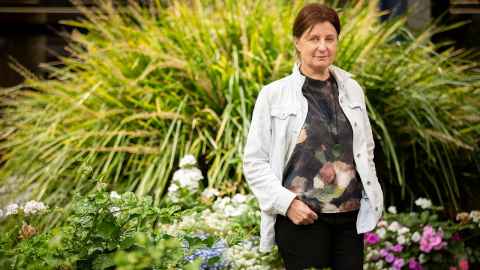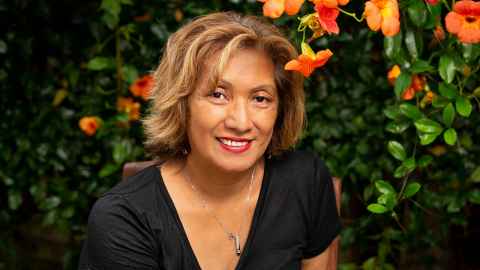Multi-media online project highlights First in Family students
31 March 2020
Awarding-winning filmmaker Professor Annie Goldson didn't have to travel too far from her University of Auckland desk for her latest documentary production, with Dr 'Ema Wolfgramm-Foliaki.

Annie is best known for her personal and political documentaries, often championing social justice causes. She’s been making them for more than 20 years but still rates her first feature-length documentary, Punitive Damage, as her most powerful. Many others have drawn acclaim, including Georgie Girl (2002), An Island Calling (2008) Brother Number One (2011), He Toki Huna: New Zealand in Afghanistan (2013) and 2017’s Kim Dotcom: Caught in the Web.
The triggers for many of her films are little things she’s overheard or seen that pique her interest, from clips in the newspaper to casual conversations and, as it turns out, pitches by fellow staff members. Great ideas are everywhere, she tells her students, but they have to be realisable. Will they be able to be turned into a documentary? Will they attract funding and an audience?
Annie was on a committee for the World Universities Network (WUN) which was offering development funding for projects with international potential. An applicant had made it through the first two stages and then had to be interviewed by a panel that included Annie.
That applicant was a lecturer from the Faculty of Education and Social Work, Dr ’Ema Wolfgramm-Foliaki, who talked about her First in Family (FiF) research – studies of people attending the University of Auckland who were the first in their whānau to do so.
“It struck me the subject would make an interesting documentary, to look at the particular issues that First in Family face,” says Annie.
“I hadn’t met Annie before so I wasn’t really sure what her background was,” says ’Ema. “But during my interview she mentioned the idea of a potential documentary, so that was interesting.”
’Ema won funding for her FiF project with the colleagues she’d been working with including researchers from overseas universities, as is required by the WUN.
“We went on and completed it that year and published a number of articles and a book,” says ’Ema.
Annie was busy with the Kim Dotcom film but when that was completed, she contacted ’Ema.
“Initially I thought of it as a documentary, but it would have had to be a longitudinal documentary,” says Annie. “They take a lot of production time so we decided to do it as a website with video, engaging with online tools, to make it simpler.”
The idea was for it to appeal to other students and potential students. The pair managed to get funding from Education and Social Work’s Faculty Research Development Fund (FRDF) that helped with research, filming, photography and production.
“I hired mostly talented student and post-student crew,” says Annie. “Designer/cinematographer Renke An and directors Lila Bullen-Smith and Julie Zhu, along with some great photographers.”
The result is a standalone website but the project will also later be hosted on The Big Q founded by Dr Maria Armoudian (Politics and International Relations) and possibly on mainstream media sites.
We’re trying to capture a sense of the students’ lives ... you’re getting a first-hand account of their experiences and thoughts.
INTERVIEWS ON CAMERA
The directors interviewed ten of the FiF students on camera, with six making it to the final site. The interviews were transcribed, then edited into short documentaries.
The transcriptions were used as a basis for short biographies but also work, in full, as research interviews for ’Ema’s academic project. Each student was then photographed, sometimes with their families, producing striking photo essays.
“We’re trying to capture a sense of the students’ lives,” says Annie.
“First in Family students are usually assessed through quantitative measures – what’s their dropout rate, what’s their pass rate? This is more like a qualitative study because you’re getting a first-hand account of their experiences and thoughts.”
The website features six students from different backgrounds – Moana, Faith, Shelby, Arapeta, Java and Tyler. Annie acknowledges that certain students tended to self-select for the project so they may be at the confident end of the cohort, but the students are still a diverse bunch, enrolled in a range of courses of study.
Moana is one of those who features online. She’s the daughter of a Japanese factory manager and a Samoan worker, who moved to New Zealand at a young age to live with her grandparents.
She says going to university has “always been a personal goal of mine but also for my grandparents. I really wanted to go to uni for them. I’m definitely not here just for me.”
Over the course of the year, Moana says she’s gained the confidence to speak up about an issue that arose for her during her studies.
“I didn’t expect to get angry. Part of my degree is talking about global views and I do feel like sometimes I’m not represented well or they don’t understand our [Pacific] views well enough to talk about them.”

CLASS PLAYS A PART
Research shows FiF students are more likely to underperform at university and are at risk of dropping out, especially in their first year. They tend to come from lower socio-economic backgrounds, straddle more than one culture and report feeling out of place in a tertiary institution.
For the WUN project, ’Ema worked with researchers from Sydney, Western Australia and South Africa among others. As it turns out, there are different definitions of what First in Family means in different countries.
“The traditional definition is it’s a first-generation student,” says ’Ema.
“But the description is quite limiting when it’s just the immediate family. For Pacific and Māori students and, surprisingly enough, students from South Africa, First in Family isn’t just first-generation. It’s a student who is first in their immediate family, first in the extended family, and can also be first in the village or church. So we decided that First in Family seemed appropriate as a way of bringing together a quite complex group ... in fact, we know when you drill down you realise it’s not just family.”
Annie says there is a degree of cognitive dissonance with the students who are proud to be FiF but when they come to university they are often lumped in with all first-years or put in at-risk programmes based on ethnicity.
“My interest was partly that this seemed to be more about class than anything else.”
’Ema agrees: “The University doesn’t have a FiF programme, so often they get moved into Tuakana or programmes for Māori students. But first-year students are quite a complex group and I think that’s the other challenge. While FiF students’ needs might be similar, they do have quite specific needs.
“There’s some really rich data on First in Family. FIF students talk about their families’ support as being critical to their success. But, on the other hand, literature tells us that a family’s lack of knowledge about university life is a really negative issue. Because mum and dad didn’t go to uni, students feel they can’t help them or engage with them in a critical discourse. It creates a barrier and becomes a predictor for success of FiF students.”
Despite what the literature says about FiF students, they are ‘pioneers’ and role-models within their families and communities.
CULTURE SHOCK
She says for many the culture shock of such a huge place is also a challenge.
“I once read on a blog from a US university about this First in Family Latino American student. He’d left home to go to college and on his first weekend back at home, his mum asked how university was. He said ‘Mum, it’s like going to a different country’.”
The same can be true here, she says.
“Despite what the literature says about FiF students, they are ‘pioneers’ and role-models within their families and communities.
“One of the students we interviewed in the WUN project told us her grandfather picked her up from the University one evening. He was waiting for her and she was taking a little bit longer so he got out of the car and walked onto campus.
“When she met up with him, he was quite overwhelmed. For the whole time he’d lived in this country, that was the first time he’d stepped onto university land. Think about the magnitude of that. So it’s quite scary and a huge challenge for Fif students.”
– Denise Montgomery
See the FiF project at https://fif.op.co.nz/
This article first appeared in UniNews April 2020. Take a look at the whole magazine.
Contact UniNews with your stories.